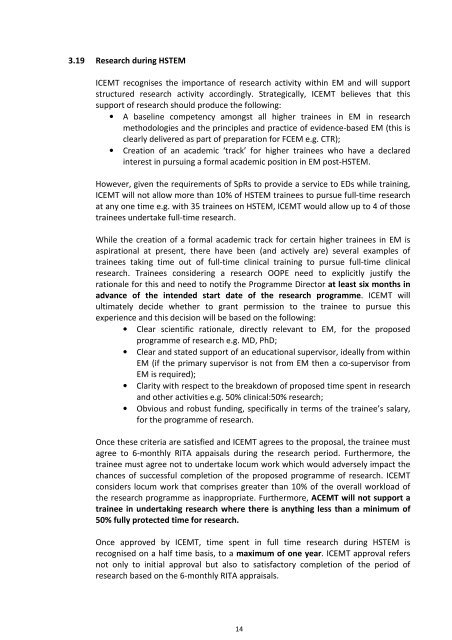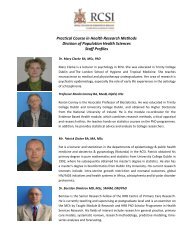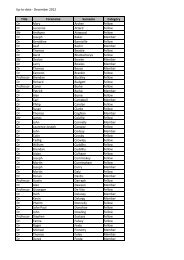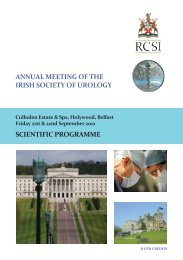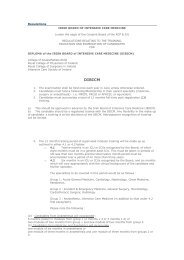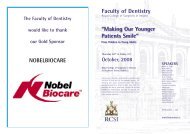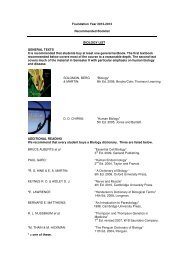Irish Committee On Emergency Medicine Training - Royal College of ...
Irish Committee On Emergency Medicine Training - Royal College of ...
Irish Committee On Emergency Medicine Training - Royal College of ...
Create successful ePaper yourself
Turn your PDF publications into a flip-book with our unique Google optimized e-Paper software.
3.19 Research during HSTEM<br />
ICEMT recognises the importance <strong>of</strong> research activity within EM and will support<br />
structured research activity accordingly. Strategically, ICEMT believes that this<br />
support <strong>of</strong> research should produce the following:<br />
• A baseline competency amongst all higher trainees in EM in research<br />
methodologies and the principles and practice <strong>of</strong> evidence-based EM (this is<br />
clearly delivered as part <strong>of</strong> preparation for FCEM e.g. CTR);<br />
• Creation <strong>of</strong> an academic ‘track’ for higher trainees who have a declared<br />
interest in pursuing a formal academic position in EM post-HSTEM.<br />
However, given the requirements <strong>of</strong> SpRs to provide a service to EDs while training,<br />
ICEMT will not allow more than 10% <strong>of</strong> HSTEM trainees to pursue full-time research<br />
at any one time e.g. with 35 trainees on HSTEM, ICEMT would allow up to 4 <strong>of</strong> those<br />
trainees undertake full-time research.<br />
While the creation <strong>of</strong> a formal academic track for certain higher trainees in EM is<br />
aspirational at present, there have been (and actively are) several examples <strong>of</strong><br />
trainees taking time out <strong>of</strong> full-time clinical training to pursue full-time clinical<br />
research. Trainees considering a research OOPE need to explicitly justify the<br />
rationale for this and need to notify the Programme Director at least six months in<br />
advance <strong>of</strong> the intended start date <strong>of</strong> the research programme. ICEMT will<br />
ultimately decide whether to grant permission to the trainee to pursue this<br />
experience and this decision will be based on the following:<br />
• Clear scientific rationale, directly relevant to EM, for the proposed<br />
programme <strong>of</strong> research e.g. MD, PhD;<br />
• Clear and stated support <strong>of</strong> an educational supervisor, ideally from within<br />
EM (if the primary supervisor is not from EM then a co-supervisor from<br />
EM is required);<br />
• Clarity with respect to the breakdown <strong>of</strong> proposed time spent in research<br />
and other activities e.g. 50% clinical:50% research;<br />
• Obvious and robust funding, specifically in terms <strong>of</strong> the trainee’s salary,<br />
for the programme <strong>of</strong> research.<br />
<strong>On</strong>ce these criteria are satisfied and ICEMT agrees to the proposal, the trainee must<br />
agree to 6-monthly RITA appaisals during the research period. Furthermore, the<br />
trainee must agree not to undertake locum work which would adversely impact the<br />
chances <strong>of</strong> successful completion <strong>of</strong> the proposed programme <strong>of</strong> research. ICEMT<br />
considers locum work that comprises greater than 10% <strong>of</strong> the overall workload <strong>of</strong><br />
the research programme as inappropriate. Furthermore, ACEMT will not support a<br />
trainee in undertaking research where there is anything less than a minimum <strong>of</strong><br />
50% fully protected time for research.<br />
<strong>On</strong>ce approved by ICEMT, time spent in full time research during HSTEM is<br />
recognised on a half time basis, to a maximum <strong>of</strong> one year. ICEMT approval refers<br />
not only to initial approval but also to satisfactory completion <strong>of</strong> the period <strong>of</strong><br />
research based on the 6-monthly RITA appraisals.<br />
14


